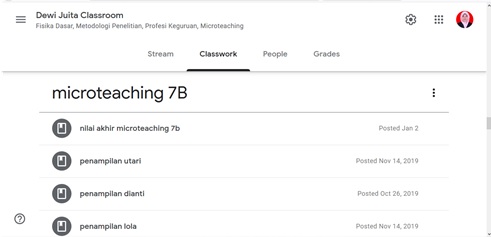
The Role of Google Classroom Accompanied by YouTube Media in Efforts to Improve The Quality of Microteaching Lectures in The Biology Department of IAIN Kerinci
Abstract
Keywords
Full Text:
PDFReferences
Bondarenko, O., Mantulenko, S., & Pikilnyak, A. (2019). Google classroom as a tool of support of blended learning for geography students. arXiv preprint arXiv,1902.00775.
Fraenkel, J. R., & Wallen, N. E. (1993). How to design and evaluate research in education (3 ed.). New York, NY: McGraw-Hill.
Furqon. (2011). Statistika Terapan untuk Penelitian. Bandung: Alfabeta
Ginanjar, A., Saragih, S., & Kartini, K. (2019). Effectiveness of learning with scientific approach in cooperative model of STAD-based type lesson study. Journal of Educational Sciences, 3(2), 249-259.
Gunawan, F. I., & Sunarman, S. G. (2018). Pengembangan kelas virtual dengan google classroom dalam keterampilan pemecahan masalah (problem solving) topik vektor pada siswa SMK untuk mendukung pembelajaran. Prosiding Seminar Nasional Pendidikan Matematika Etnomatnesia.
Hake, R. (1999). Analyzing change/ gain scores. Indiana: Indiana University
Hardiyana, A. (2015). Implementasi google classroom sebagai alternatif dalam meningkatkan mutu pembelajaran di sekolah. Karya Tulis Ilmiah. Cirebon: SMA Negeri, 1.
Haryoko, S. (2012). Efektivitas pemanfaatan media audio-visual sebagai alternatif optimalisasi model pembelajaran. Jurnal Edukasi Elektro, 5(1).
Juita, D., & Yusmaridi, M. (2019). Efektivitas pembelajaran leading by example pada mata kuliah micro teaching pada jurusan tadris biologi. Journal of Natural Science and Integration, 2(1), 34-43.
Junita, D., Suarman, S., & Kartikowati, S. (2018). Accomplishment motivation and soft skill related to learning achievement. Journal of Educational Sciences, 2(2), 83-89.
Khan, M. L. (2017). Social media engagement: What motivates user participation and consumption on YouTube?. Computers in Human Behavior, 66, 236-247.
Marina, M., Indrawati, H., & Suarman, S. (2019). Application of moving class learning models and teacher pedagogical competence on learning motivation and student learning discipline. Journal of Educational Sciences, 3(1), 72-83.
Priyono. (2008). Metode Penelitian Kuantitatif. Sidoarjo: Zifatama Publishing
Putra, A. (2010). Bahan Mata Kuliah Metodologi Penelitian Pendidikan (3 SKS). Padang: FMIPA UNP.
Reddy, K. R. (2019). Teaching how to teach: microteaching (a way to build up teaching skills). Journal of Gandaki Medical College-Nepal, 12(1), 65-71.
Saban, A., & Çoklar, A. N. (2013). Pre-service teachers' opinions about the micro-teaching method in teaching practise classes. Turkish Online Journal of Educational Technology-TOJET, 12(2), 234-240.
Yanti, H. (2006). Tanya Jawab Seputar Penelitian Pendidikan Sains. Jakarta: FTIK UIN Syarif Hidayatulloh Jakarta.
DOI: http://dx.doi.org/10.31258/jes.4.2.p.239-249
Refbacks
- There are currently no refbacks.
Copyright (c) 2020 Dewi Juita, Yusmaridi M

This work is licensed under a Creative Commons Attribution 4.0 International License.
Publisher: FKIP Universitas Riau












